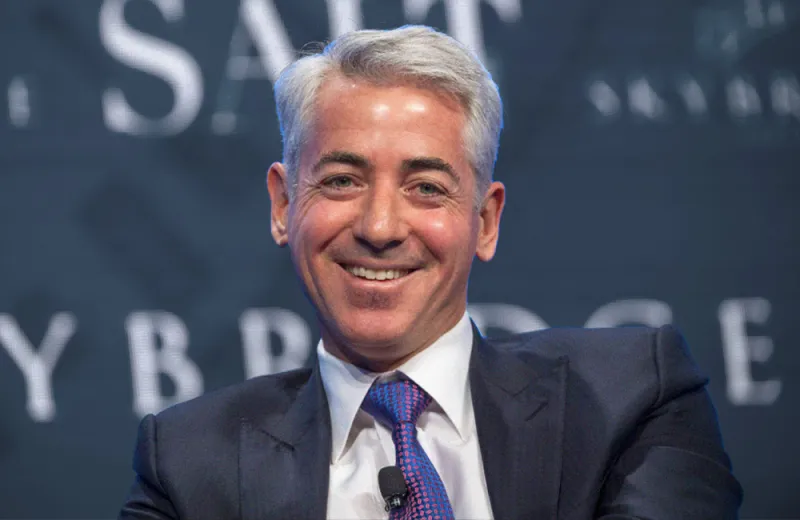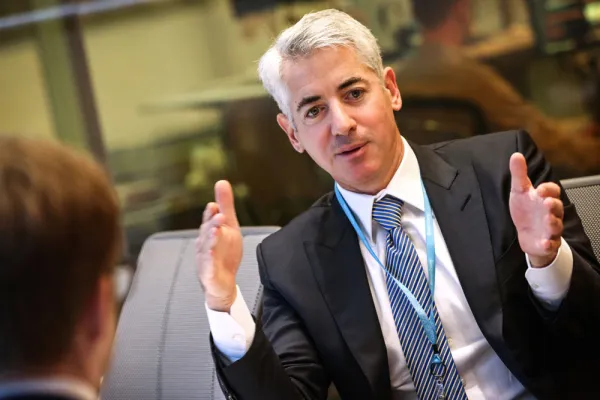Hedge fund manager Bill Ackman took March by storm, gaining 10.6 percent during the month and narrowing his losses for the year to 1.7 percent, according to results for his Pershing Square Holdings publicly traded hedge fund.
There’s plenty of good news at Pershing Square, including an interest rate hedge against inflation that has been the year’s top performer. In fact, before the market rally in late March, the hedge was the only positive contributor to the portfolio — gaining 7.3 percentage points on a gross basis through March 22 — with the exception of a renewed stake in Canadian Pacific, previously one of Pershing Square’s most successful proxy campaigns.
But while Ackman is adroitly managing the geopolitical turmoil roiling the markets, he is facing unrelated headwinds. These are mostly tied to his beleaguered special purpose acquisition company, Pershing Square Tontine Holdings, including his plans to replace it with a newfangled security called a SPARC, or special purpose acquisitions rights company.
These issues may help explain Ackman’s recent announcement that Pershing Square will no longer be a noisy activist on either the short or the long side — an announcement that is not news to anyone who has followed Ackman over the last several years. Not only has the hedge fund manager made such public proclamations before, he also hasn’t launched a proxy battle or taken on corporate managements since his 2017 skirmish with ADP, and he swore off activist short selling when he exited Herbalife in February of 2018.
While this latest announcement in Pershing Square Holding’s annual report generated a few headlines, the stories missed a significant preface: “Importantly for our reputation as a supportive constructive owner, we have permanently retired from this line of work,” Ackman wrote in a letter to shareholders accompanying the report.
In fact, the Pershing Square CEO needs the validation of both the SEC and the corporate execs he is wooing these days.
First, the SEC. As the the regulator bears down on SPACs under Chairman Gary Gensler, it appears to be trying to make Ackman a poster child for the current era’s excesses. After all, Ackman launched Tontine to great fanfare in July of 2020, raising $4 billion, the largest ever for a SPAC IPO — after which the SPAC boom took off.
But by last summer, the SEC was nixing Tontine’s plans to take a stake in Universal Music Group ahead of its partial spinoff from Vivendi. So Ackman pivoted, in part by progressing with plans for a vehicle (his SPARC) that would avoid some of the inherent weaknesses of SPACs — only for the SEC to demand more assurances about the SPARC. And last week, a proposed new SEC rule gave a tacit endorsement to the claims of a lawsuit filed against Pershing Square’s Tontine SPAC by saying SPACS could avoid such complaints by doing their deals more quickly.
In the meantime, Ackman’s SPAC is running out of time to find a merger partner for Tontine. The SPAC is already 20 months old, and under its own terms only has four more months to strike a deal unless shareholders approve an extension. The compressed timeframe anticipated in the new SEC rules of 18 months — while not yet approved — could give ballast to the lawsuit against it.
However, Ackman’s real hopes lay with his SPARC, if the SEC will approve it. A SPARC would avoid some of the issues surrounding SPACs because investors wouldn’t have to pony up cash while waiting for a deal. Such provisions in SPACs have been the ammunition for the lawsuit against Tontine, which argued that the SPAC should fall under the more highly regulated Investment Company Act because Tontine takes the proceeds of its IPO and invests them in Treasurys and other government securities while waiting to clinch a deal.
Moreover, a SPARC would have another improvement over the traditional SPAC: Its warrants would immediately turn into stock of the merged company, thus avoiding the dilution that tanks the stock of current SPACs once a deal is done. As Ackman noted in his letter, “In light of typical SPACs’ highly dilutive structures with founder stock, large underwriting fees, and dilutive shareholder warrants outstanding, it is the rare SPAC transaction that has been able to create even short-term value for shareholders.”
Ackman then explained how the SPARC avoids all that. “With no shareholder warrants or underwriting fees, SPARC will have an extremely simple and efficient capital structure with only common stock outstanding, other than 20 percent out-of-the-money sponsor and director warrants on 5.21 percent of the post-transaction merged company,” he wrote. “We expect that SPARC’s simple capital structure, de minimis frictional costs, and unlimited scalability, backed by a large capital commitment from the Pershing Square funds on the same terms as the SPAR holders will make SPARC an ideal vehicle for private companies to go public, a much more attractive alternative than going public in a conventional IPO.”
The SEC set May 8 as its deadline to reach a decision about the SPARC.
Meanwhile, Ackman insists in the letter that Pershing Square has a “reputation as a constructive, long-term, and helpful owner. The world of large capitalization public companies is small, and our reputation as a thoughtful investor has therefore become well known among CEOs, boards, and others who matter.”
Over the past five years — which includes his ill-fated proxy battle at ADP that nonetheless created significant changes at the company and gains for Pershing Square’s investors — he says “all of our interactions with companies… have been cordial, constructive, and productive. We intend to keep it that way as it makes our job easier and more fun, and our quality of life better.”







